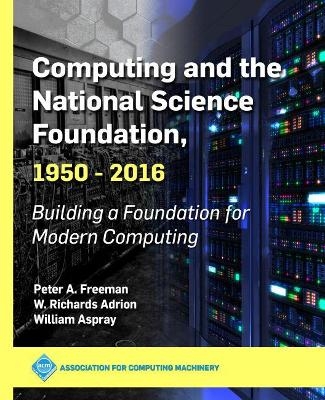
Computing and the National Science Foundation, 1950-2016
Association of Computing Machinery,U.S. (Verlag)
978-1-4503-7276-3 (ISBN)
This organizational history relates the role of the National Science Foundation (NSF) in the development of modern computing.
Drawing upon new and existing oral histories, extensive use of NSF documents, and the experience of two of the authors as senior managers, this book describes how NSF's programmatic activities originated and evolved to become the primary source of funding for fundamental research in computing and information technologies.
The book traces how NSF's support has provided facilities and education for computing usage by all scientific disciplines, aided in institution and professional community building, supported fundamental research in computer science and allied disciplines, and led the efforts to broaden participation in computing by all segments of society.
Today, the research and infrastructure facilitated by NSF computing programs are significant economic drivers of American society and industry. For example, NSF supported work that led to the first widely-used web browser, Netscape; sponsored the creation of algorithms at the core of the Google search engine; facilitated the growth of the public Internet; and funded research on the scientific basis for countless other applications and technologies. NSF has advanced the development of human capital and ideas for future advances in computing and its applications.
This account is the first comprehensive coverage of NSF's role in the extraordinary growth and expansion of modern computing and its use. It will appeal to historians of computing, policy makers and leaders in government and academia, and individuals interested in the history and development of computing and the NSF.
Peter A. Freeman, a computer scientist (Carnegie Mellon University, 1970), was the seventh AD/CISE from 2002–2007 and DD/CCR from 1987–1989. Previously he held faculty positions at the University of California, Irvine and Georgia Tech, where he was Founding Dean of Computing in 1990. After NSF he returned to Georgia Tech as Emeritus Dean and Professor and was an active consultant with the Washington Advisory Group. While in academe he was an active researcher, educator, and participant in professional society activities. He is a fellow of the ACM, AAAS and IEEE. W. Richards "Rick" Adrion is Professor Emeritus of Computer Science at the University of Massachusetts Amherst. He continues to be an active researcher in software engineering and computer science education, leading several large NSF projects during his career. He served as an NSF program director from 1976–1978 and 1980–1986, a division director from 2000–2002, and a CISE senior scientist in 1986 and 2002–2003. He held full-time positions at the University of Texas at Austin, Oregon State, and the National Bureau of Standards, as well as consulting, part-time, and visiting positions at a number of not-for-profit organizations, corporate labs, and universities here and abroad. He is a fellow of the ACM and AAAS. William Aspray is Professor of Information Science at the University of Colorado Boulder. He is trained as a historian of science and has spent most of his career studying the histories of computing, information, mathematics, and electrical engineering. He formerly taught at Harvard University, Indiana University Bloomington, University of Pennsylvania, University of Texas at Austin, Virginia Tech, and Williams College, and served in leadership positions at the Charles Babbage Institute, Computing Research Association, and IEEE History Center. He led a history of computing project at NSF in the early 1990s, and he has published three articles and a book about NSF computing activities (Participation in Computing: The National Science Foundation's Expansionary Programs, Springer, 2016).
Preface
PART I CHRONOLOGICAL HISTORY
1950-1974: Science Information, Computing Facilities, Education, and Basic Research
1974-1986: CER, CSNET, NSFNET, and the Founding of CISE
1986-1998: The New Directorate in a Period of Computer Science Expansion
1999-2006: Broadening Computer Science with New Initiatives
2007-2016: The Growing Centrality of CISE to NSF
PART II SELECTED SUBJECT STUDIES
Pre-CISE Computing Facilities and Education Programs
Pre-CISE Computing Research
Information Technology Research
Networking Research and Deployment
NSF Support of High-Performance Computation
CISE's Role in Broadening Participation in Computing
What Does an AD/CISE Do?
PART III SUMMARY AND CONCLUSIONS
Summary and Conclusions
APPENDIXES
Computing Organizations at NSF
| Erscheinungsdatum | 09.12.2019 |
|---|---|
| Verlagsort | New York |
| Sprache | englisch |
| Maße | 191 x 235 mm |
| Themenwelt | Geschichte ► Teilgebiete der Geschichte ► Technikgeschichte |
| Mathematik / Informatik ► Informatik ► Theorie / Studium | |
| ISBN-10 | 1-4503-7276-7 / 1450372767 |
| ISBN-13 | 978-1-4503-7276-3 / 9781450372763 |
| Zustand | Neuware |
| Haben Sie eine Frage zum Produkt? |
aus dem Bereich


